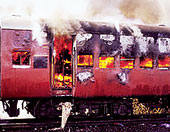Azadi’s Daughter: Journey of a Liberal Muslim
By Seema Mustafa, Imprint One, Rs 395

A book written by a Muslim woman about issues of national importance is sure to be taken seriously. Though the book under review talks about the contemporary Muslim psyche, it is also a commentary on the country, its politics and the mindset of its people.
The word ‘azadi’ in the title can be read as ‘freedom’. But Azadi is also the name of the author’s mother. Seema Mustafa writes without inhibition. The book, as she says in the preface, was born out of her discussion about the ‘Muslim mood in India’ with one of her colleagues. The book combines many things: communal riots, the Gujarat pogrom, army repression in Jammu and Kashmir and the Northeast, terrorism, the Sachar report, the question of reservation, the condition of women, the effect of 9/11 on Muslims in India and abroad, apprehensions and dreams of the Muslim youth. It mentions some instances of repression by the police that are shocking, since they violate the notions of democracy and secularism. Anger, fear and sorrow are palpable in the accounts. But Mustafa is optimistic about the Muslim youth, and has an abiding faith in secularism and democracy.
The book records the life of a Muslim lady brought up on liberal values. It also offers a dispassionate view of the Muslim community in India. The account may help to change the stereotypical ideas about the community, its youth and especially its women. It tells us how Muslim girls, even in villages, want to be educated. Mustafa shows how the community is neglected, discriminated and repressed by the insensitive State machinery. But the young men and women of the community still have not lost faith in democracy and a pluralistic society. They want to acquire modern education and lead a better life.
Mustafa identifies a marked shift in Indian politics over the decades, especially after the demolition of the Babri Masjid. She also points to the apathy of political parties about the damage to the secular fabric of the country. Unlike journalists who resort to euphemism when talking about communal issues, Mustafa speaks candidly. She recalls the brazenness with which the Babri Masjid was razed to the ground and the brutality of the 1984 riots. The government, on both the occasions, did not even try to put up a resistance. The violation of human rights in the treatment of Muslim youths picked up in Hyderabad and elsewhere by intelligence branches should be an eye-opener. If Mustafa is angry, she is also worried that the country is being hijacked by communal elements.
Mustafa has the mind of a true journalist; that is her strength as well as her weakness. She weighs everything on the anvil of logic. Her language fails to come out of the confines of journalistic parlance, but she remains true to her purpose of presenting the real picture. Mustafa speaks from a strong sense of injustice. She staunchly criticizes fundamentalists of every community. Even with her elitist background, she feels more for the poor people of her community than the conservative mullahs.
source: http://www.telegraphindia.com / The Telegraph, Calcutta / Front Page> Opinion> Story / Friday – February 08th, 2013








